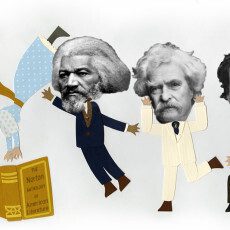- March 25, 2014
- By Liam Farrell
Everyone remembers reading one of them. Maybe it was in high school or in college, maybe for a class on British literature or American writers. The individual circumstances and edition may differ, but the name always starts the same: the Norton Anthology.
And while it feels like it has and always will be there, a dedicated group of people, including UMD English Professor Robert Levine, works to make sure those books actually land on shelves.
The general editor of “The Norton Anthology of American Literature,” Levine will soon begin compiling its ninth edition, scheduled for publication in 2017. The anthology is revised every five years, and Norton says more than 2.5 million students have read it in the last three decades.
With that ubiquity, Levine is aware that his choices of short stories, book excerpts, letters, speeches and diary entries will literally and figuratively carry a lot of weight.
“You know whatever work you are doing is going to be read by many people,” he says.

Levine specializes in 19th-century American literature, focusing on authors such as Nathaniel Hawthorne, Harriet Beecher Stowe and Herman Melville. He won a lifetime achievement award in December from the Modern Language Association and is spending the year on a Guggenheim Fellowship and as a fellow at Texas A&M University’s Institute for Advanced Study. He is editing multiple volumes of Frederick Douglass’s work and writing a book on his autobiographies and cultural legacy.
He began with Norton in 2004, when he edited the American literature volume on works from 1820–65. Since then, his responsibilities have increased from editing one of its five volumes to also overseeing the selection and work of editors on the entire anthology.
Levine said they look over market surveys of what is being read and what teachers and others want to see in a new edition, and recently he has been traveling to collect feedback from professors, students and salespeople. When he first began editing his 19th-century volume a decade ago, one of the biggest demands was for more diversity in the authors.
“People were complaining about the selections,” he says. “African-American writing and writing by women were relatively underrepresented, especially in the volume I took on.”
Heading into the latest revising process, Levine wants to add more about science and technology, using a Hawthorne story about a man who constructs a mechanical butterfly and an Edgar Allan Poe tale about a soldier who has become more machine than man, along with some selections from science writers of the period.
“You don’t want to make major transformations,” he says. “But you want to keep up with what is happening in the field and what is happening in our culture.”
The anthology can also try to correct some bad classroom habits. For example, Levine says, the common treatment of Hawthorne’s “The Scarlet Letter” leads to “too much symbol hunting” and other activities suited to pop quizzes. By writing an introduction that provides weight to history and the author’s influences—“I try to give a sense of Hawthorne’s very profound engagement with feminist thinking”—Levine hopes to give the story more life.
That way, he says, the writing “recovers its historical vitality.”
“We can help to shape how major writers will be understood,” he says. “That’s really fun.
